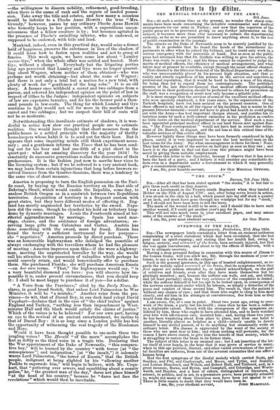JrItu tu tbr attn.
THE MEDICAL DEPARTMENT OF THE ARMY.
6th June.
Sm—At such a serious time as the present, no wonder that sharp com- ments have been made concerning the defective commissariat and medical arrangements for our army in Turkey; and now that the reporters of the public press are to be prevented giving us any further information on the subject, it becomes more than ever necessary to submit the departmental economy, as far as we are permitted to know anything about it, to the test of public examination in the journals.
The attacks on the Duke of Newcastle seem to be scarcely justified by the facts. It is probable that he found the heads of the subordinate de- partments in office when he joined the Cabinet, and he could only work in a serious emergency with the materials at hand. But as soon as the public press had informed him that Dr. Guthrie was willing to give his advice, the Duke was ready to accept it ; and his Grace cannot be expected to judge the merits of medical officers, the efficiency of medical arrangements, and what talent may at present be available, except through the usual official channel. That channel is the Director-General of the Medical Department; an officer who was unaccountably placed in his present high situation, and that so rudely and utterly regardless of his seniors in the service and superiors in professional reputation, that it would be hard to blame a man of his stamp for being thus led to regard them too contemptuously. The published promise of the late Director-General that medical officers distinguishing themselves in their profession should be preferred to others for promotion on the staff, was a recognition of merit now only become a pitiable joke.
It is most strange that the services of some of the excellent medical officers who were specially employed, a few years since, in the organization of the Turkish hospitals, have not been secured on the present occasion. One of those officers is not only in all the vigour of his faculties, but is senior to the present Director-General—would not have to plead bad health to avoid going out with the Army—has had important charges abroad, and justifies his il- lustrious name by such a well-earned eminence in his profession as confers no little lustre on the medical department of the service. Had such a man been appointed principal medical officer to our land forces sent against Rus- sia, "the Times correspondent" would not have had to record the retire- ment of Dr. Burrell, in disgust, and the sad loss at this critical time of the valuable services of this active officer.
However lightly these things may have been formerly considered in high places, surely it is very important to secure the best medical men on the best terms for the Army. But what encouragement is there for them ? None. They had better get out of the service on half-pay as aeon as they can ; and leave it to the public to find out that even this pittance might have been saved by giving them suitable employment. I address this letter to the Spectator, because I observe that it has never been the hack of a party, and I believe it will consider any remediable de- fects even in a department under a Government to which it may generally give a conscientious support.


























 Previous page
Previous page